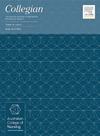护生共情倾向对文化智力的影响:一项横断面研究
IF 1.7
4区 医学
Q2 NURSING
引用次数: 0
摘要
在多元文化社会中,护生的文化智力水平和共情倾向对护生提供整体医疗服务的能力有显著影响。了解这些关系对于改善不同环境下的医疗保健实践至关重要。目的探讨共情倾向对护生文化智力的影响。方法采用描述性、横断面、相关性研究方法,于2024年3月至4月对571名志愿护理学生进行调查。我们使用了三种数据收集工具:描述性特征表、共情倾向量表(ETS)和文化智力量表(CIS)。结果护生平均年龄为21.34±2.44岁,其中女性占62.3%,一年级学生占33.6%;文化智力和共情倾向的平均得分分别为71.22±10.72和66.39±6.70。发现ETS平均分数正预测CIS平均分数(p < 0.05)。此外,女性对CIS得分有负面影响。有一个外国朋友和会一门外语是CIS得分的正向预测因子(F = 11.262, p < 0.001)。讨论研究结果显示护生文化智力和共情倾向均处于中等水平。此外,考虑到共情倾向与文化智力之间的正相关关系,在护理教育中促进共情可以提高学生有效处理文化多样性的能力。结论护生共情倾向水平对文化智力水平有正向预测作用。因此,建议将提高这些技能的课程纳入护理课程,以改善不同医疗保健环境中的文化主管护理。本文章由计算机程序翻译,如有差异,请以英文原文为准。
The effect of nursing students’ empathic tendencies on their cultural intelligence: A cross-sectional study
Background
In multicultural societies, nursing students’ ability to provide holistic healthcare is significantly influenced by their level of cultural intelligence and empathic tendencies. Understanding these relationships is essential for improving healthcare practice in diverse settings.
Aim
The objective of this study was to investigate the influence of empathic tendencies on cultural intelligence among nursing students.
Methods
This descriptive, cross-sectional, and correlational study was conducted with 571 volunteer nursing students between March and April 2024. We used three data collection tools: the Descriptive Characteristics Form, the Empathy Tendency Scale (ETS), and the Cultural Intelligence Scale (CIS). Then, we analysed the data with descriptive statistics and multiple linear regression
Results
The nursing students’ mean age was 21.34 ± 2.44 years, with 62.3% female and 33.6% first-year students. The mean scores for cultural intelligence and empathic tendency were 71.22 ± 10.72 and 66.39 ± 6.70, respectively. It was found that the average ETS score positively predicted the average CIS score (p < 0.05). Additionally, being female had a negative effect on the CIS score. Having a foreign friend and knowing a foreign language were positive predictors of the CIS score (F = 11.262, p < 0.001).
Discussion
The results of the research show that both cultural intelligence and empathic tendencies of nursing students are at medium levels. Additionally, promoting empathy in nursing education may improve students’ ability to effectively deal with cultural diversity, given the positive correlation between empathic tendencies and cultural intelligence.
Conclusion
According to the study findings, the empathic tendency level of nursing students positively predicts the level of cultural intelligence. Therefore, it is recommended that programmes that enhance these skills be included in nursing curricula to improve culturally competent care in diverse healthcare settings.
求助全文
通过发布文献求助,成功后即可免费获取论文全文。
去求助
来源期刊

Collegian
NURSING-
CiteScore
2.70
自引率
6.70%
发文量
127
审稿时长
72 days
期刊介绍:
Collegian: The Australian Journal of Nursing Practice, Scholarship and Research is the official journal of Australian College of Nursing (ACN).
The journal aims to reflect the broad interests of nurses and the nursing profession, and to challenge nurses on emerging areas of interest. It publishes research articles and scholarly discussion of nursing practice, policy and professional issues.
Papers published in the journal are peer reviewed by a double blind process using reviewers who meet high standards of academic and clinical expertise. Invited papers that contribute to nursing knowledge and debate are published at the discretion of the Editor.
The journal, online only from 2016, is available to members of ACN and also by separate subscription.
ACN believes that each and every nurse in Australia should have the opportunity to grow their career through quality education, and further our profession through representation. ACN is the voice of influence, providing the nursing expertise and experience required when government and key stakeholders are deciding the future of health.
 求助内容:
求助内容: 应助结果提醒方式:
应助结果提醒方式:


